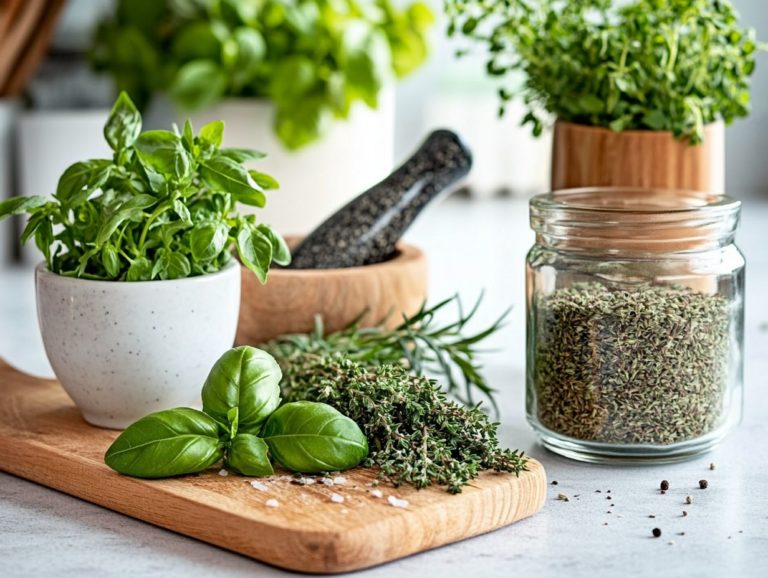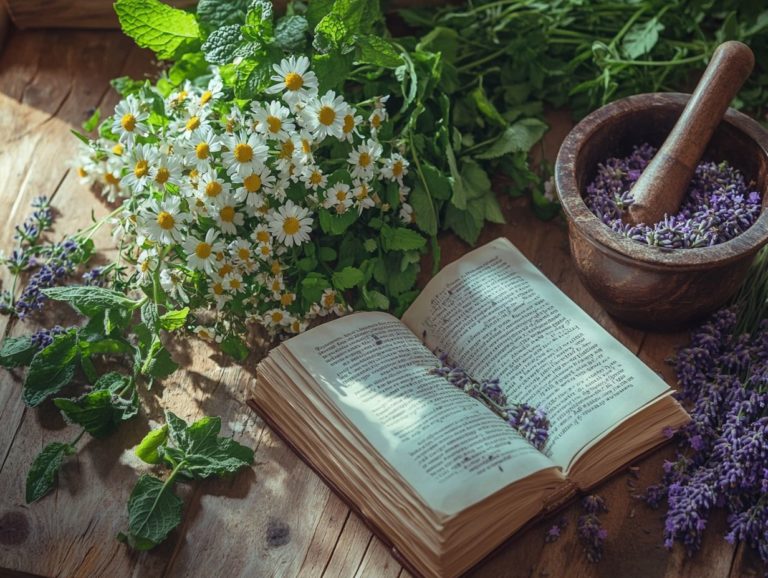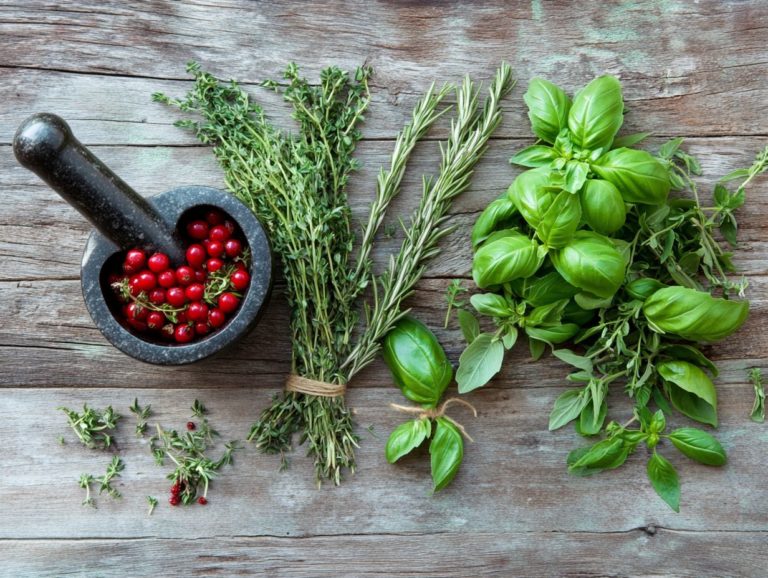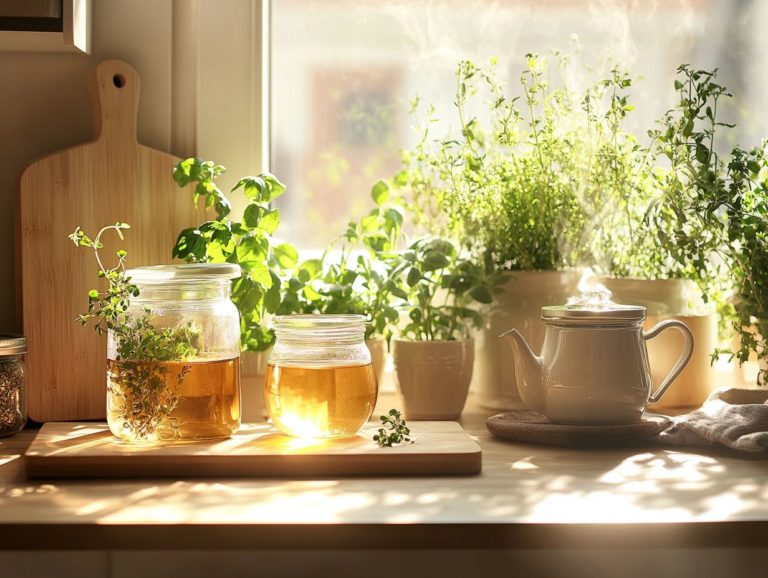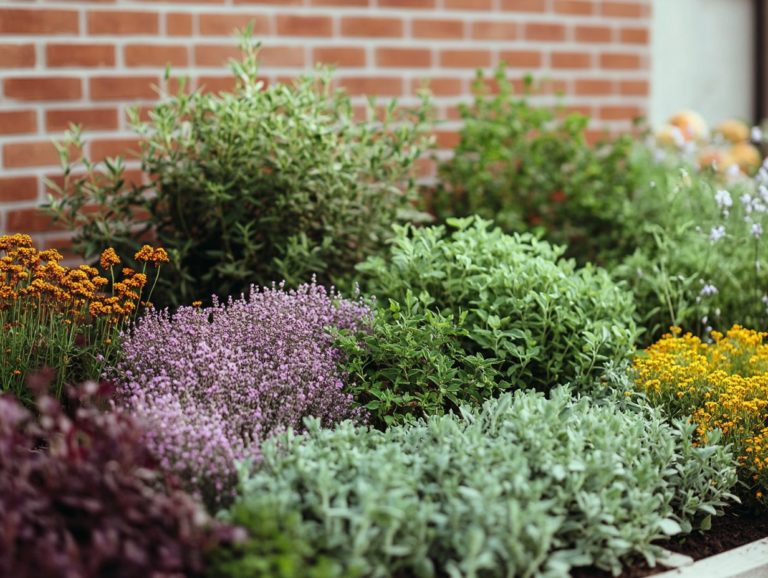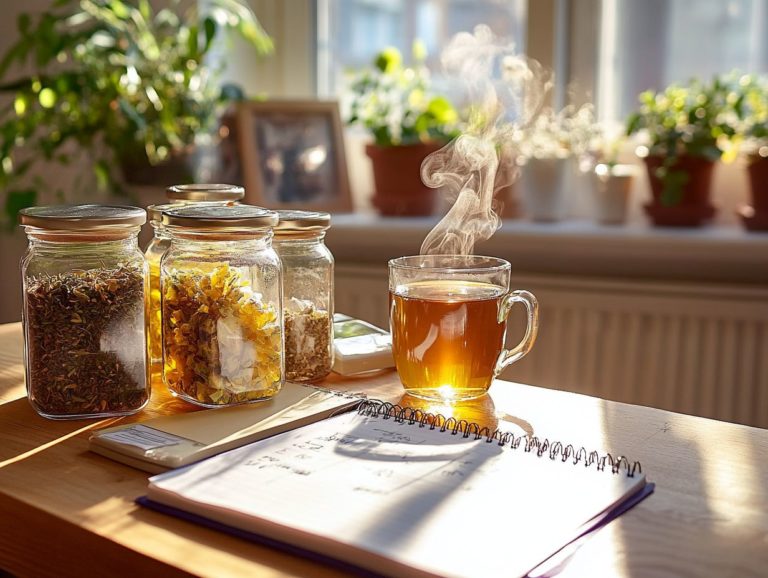How to Identify Quality Herbal Tea?
Herbal tea, a cherished beverage celebrated for its array of flavors and health benefits, can greatly differ in quality. Understanding what distinguishes premium herbal teas and organic tea is essential for any tea enthusiast like yourself.
This exploration delves into the key factors that determine quality, including sourcing and processing methods, as well as the impact of tea leaves, ingredients, and additives.
You ll discover popular types of herbal tea and their unique advantages. You ll also find tips for choosing and storing tea to ensure it remains optimally fresh.
Dive into the exciting world of herbal infusions!
Contents
Key Takeaways:
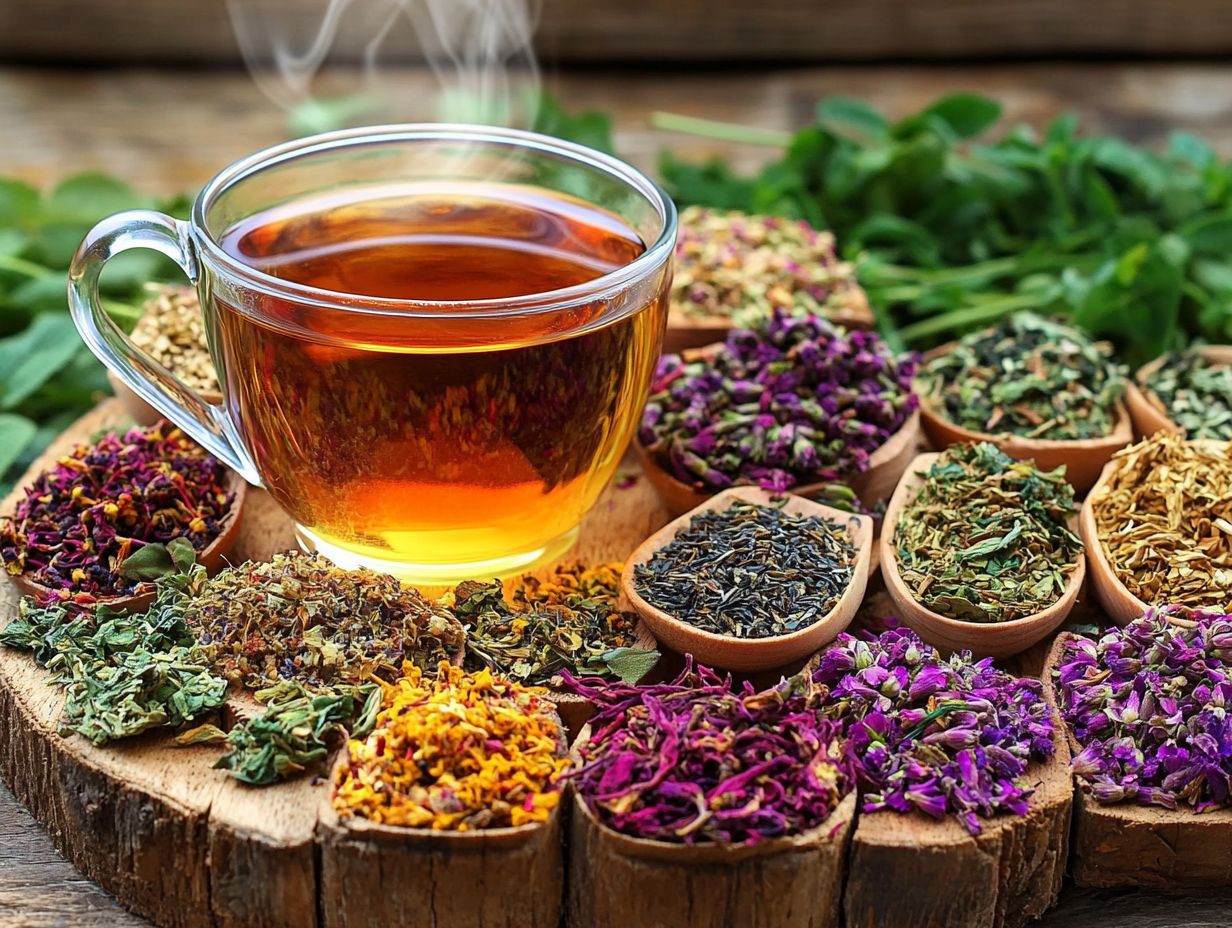
- Look for herbal teas from reputable sources that use organic tea, high-quality ingredients, and careful preparation.
- Pay attention to physical characteristics, such as color, texture, and aroma, as well as taste to determine quality.
- When selecting and storing herbal tea, choose a variety that suits your taste and store it in eco-friendly packaging in a cool, dry place to maintain freshness.
What is Herbal Tea?
Herbal tea, often referred to as herbal infusions, is a delightful beverage made from various plants, flowers, and spices, rather than the traditional tea plant, Camellia sinensis. These infusions offer a spectrum of flavors and come packed with health benefits, making them a sought-after alternative to conventional teas like chamomile or peppermint. By brewing loose leaf herbal tea, you allow the aromatic qualities and unique flavors to fully blossom, transforming tea preparation into a sensory experience.
Unlike traditional teas that contain caffeine, herbal teas are naturally caffeine-free, making them a perfect choice for unwinding at any time of day. You ll discover soothing herbs like lavender and lemongrass, along with vibrant fruits like hibiscus and lemon balm.
Each variety presents its unique characteristics; for instance, hibiscus tea is celebrated for its tart profile and potential heart health benefits, while ginger tea provides warmth and can aid in digestion.
The brewing methods can also vary, with options like steeping or cold infusion, giving you the flexibility to enjoy each infusion in your preferred style. With their rich flavors and healing properties, herbal teas offer an accessible way to weave wellness seamlessly into your daily routine.
Factors that Determine Quality
Many factors affect the quality of herbal tea, including the source of the ingredients, how tea is made, and careful preparation. You ll find that high-quality tea is typically sourced from organic farms that prioritize sustainable practices.
This commitment enhances the flavors and health benefits while positively contributing to the environment.
Source and Processing Methods
The source of your herbal tea is vital in determining its overall quality. When you choose organic tea from reputable growers, you’re likely to experience the best flavors and health benefits. The methods used for processing like how the leaves are dried and prepared greatly influence the aroma and freshness of the final product.
Regions like Bavaria are renowned for their lush landscapes and traditional cultivation techniques, which lend exceptional characteristics to their herbal blends. If you’re interested in these herbal offerings, knowing how to choose quality herbal products is essential. Similarly, Iran boasts a rich tapestry of diverse herbal varieties shaped by its unique climate and a deep-rooted history of tea cultivation.
By emphasizing organic practices, you support eco-friendly farming and ensure that you’re enjoying teas free from harmful pesticides and synthetic fertilizers. To enhance your tea experience, consider how to choose the right herbs for tea. The craftsmanship involved in the drying and processing stages enhances the integrity of each blend, allowing unique tea flavors to shine through. This offers you an authentic taste experience that resonates with tea lovers around the globe, including those who enjoy brands like Bravo Tea and Red Bud Coffee & Tea.
Start exploring your favorite herbal teas today and enjoy their amazing flavors and health benefits!
Ingredients and Additives
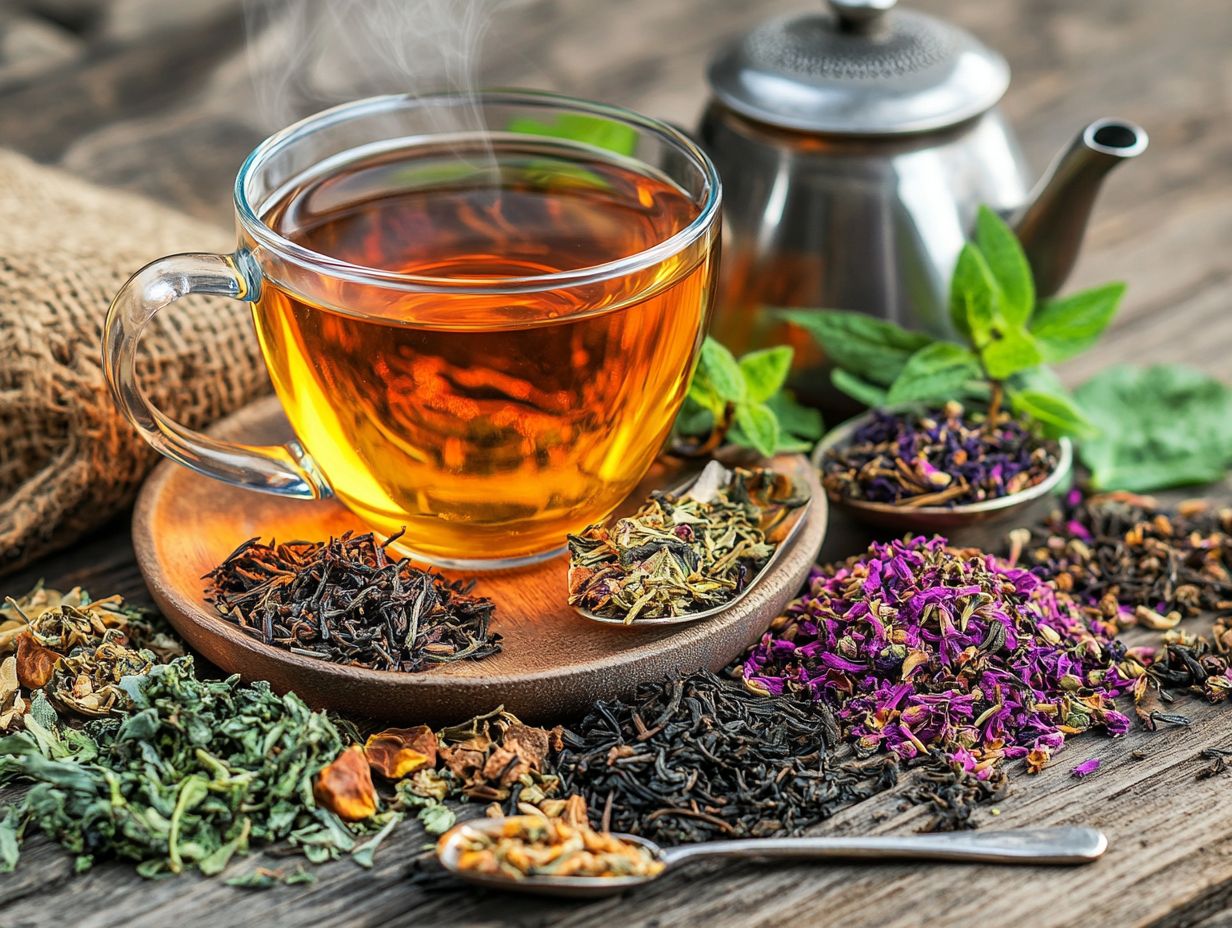
The ingredients in herbal tea vary widely. Popular choices include chamomile, ginger, lemongrass, and hibiscus, each offering unique health benefits.
Take chamomile, for example. It s famous for its calming effects and is often enjoyed to promote relaxation and improve sleep quality.
On the other hand, ginger is a favorite for its digestive properties. It delivers a lively spicy kick that can invigorate your senses.
Then there s lemongrass, which not only brings a zesty aroma to the table but also offers antioxidant qualities. This makes it a refreshing option for those looking to help support their immune system.
Hibiscus, with its stunning ruby hue, not only beautifies your brew but is also known for its potential to lower blood pressure, creating a tempting and healthful concoction.
Together, these ingredients create a delightful variety of flavors and smells, inviting you to explore a rich selection of herbal blends.
Common Types of Herbal Tea
You ll find a delightful array of herbal teas, each boasting its own unique characteristics and health concerns. Popular selections like chamomile, peppermint, rooibos, and hibiscus not only offer exquisite flavors but also address specific health concerns.
This makes herbal teas a wonderfully versatile choice for discerning tea enthusiasts like you.
Overview and Benefits of Each Type
Each type of herbal tea presents a unique fusion of flavors and health benefits tailored to meet your distinct preferences and needs. For instance, chamomile is celebrated for its calming effects, while peppermint tea shines with its digestive advantages, offering a delightful experience that enhances your overall well-being.
Hibiscus tea captures attention with its tart, fruity flavor and boasts a wealth of antioxidants, which are substances that help protect your body from damage. It supports heart health and regulates blood pressure.
If you re in search of a refreshing option, lemon balm tea not only delivers a zesty taste but also encourages relaxation and eases stress.
Ginger tea brings a spicy kick, acting as a powerful anti-inflammatory that boosts immunity and aids digestion. You can discover a fantastic variety of herbal teas, including how to choose the right one, with a perfect blend awaiting you to delight your taste buds and support your health goals!
Identifying Quality Herbal Tea
Identifying high-quality herbal tea demands your keen insight into the physical characteristics, aroma, and flavor profile of the tea leaves. By recognizing these elements, you can significantly elevate your herbal tea experience, ensuring that you select blends that are not only beneficial for your well-being but also a true delight for your palate.
Physical Characteristics to Look For
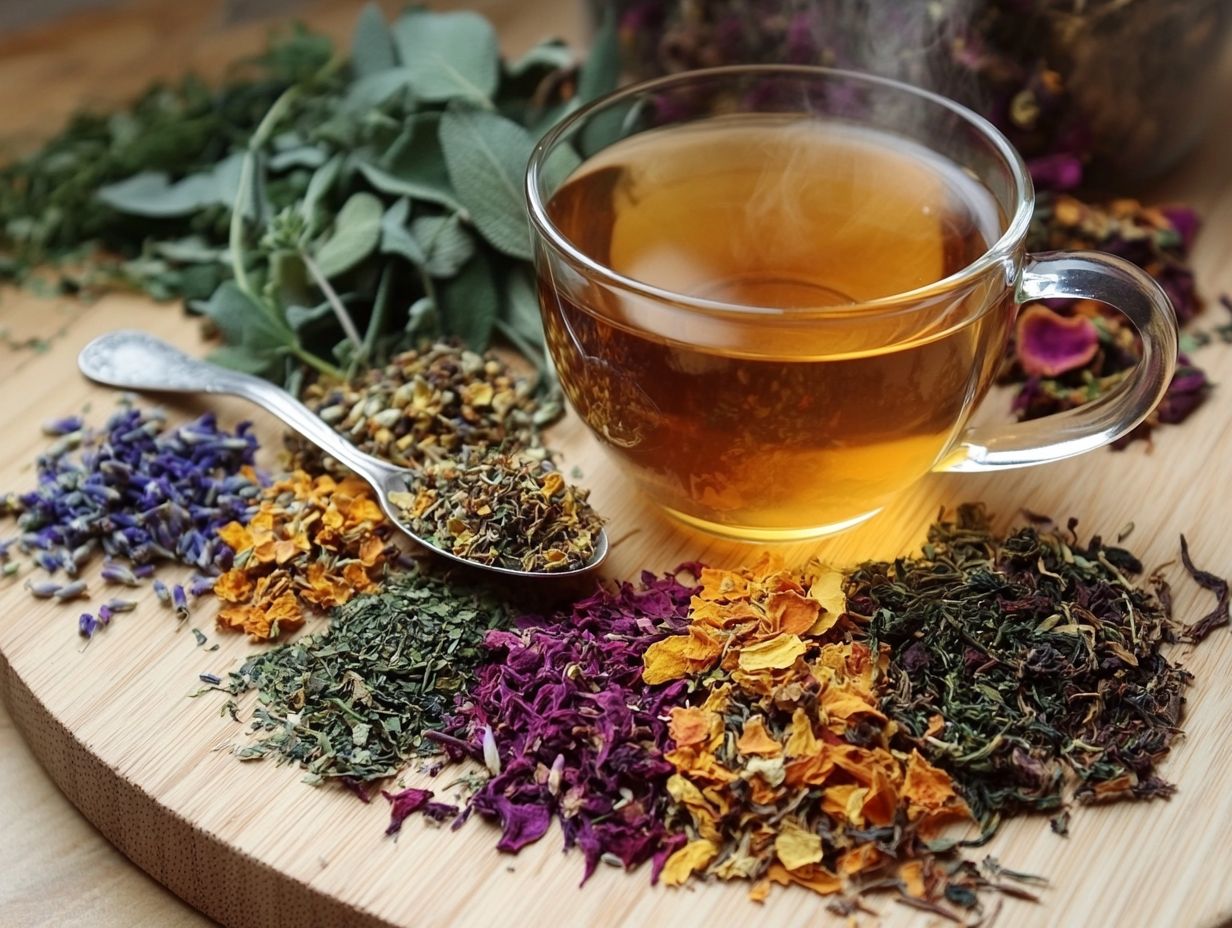
When evaluating the physical characteristics of herbal tea, you should be on the lookout for vibrant, intact leaves that signal freshness and high quality. Whole leaves, as opposed to broken pieces, often indicate a superior product that will provide a more flavorful and aromatic infusion.
Beyond the integrity of the leaves, pay attention to their size; larger leaves typically suggest a more robust flavor profile.
Color is equally important rich greens, deep reds, or lively yellows can reflect the tea’s exceptional botanical origins and nutrient content.
Texture matters too; leaves that feel supple and moist are often a sign of proper storage and handling, while brittle leaves may hint at age or inferior quality. Together, these factors play a vital role in shaping your overall tasting experience.
Taste and Aroma Indicators
Taste and tea aroma are essential indicators of quality in herbal tea. A pleasant smell combined with a balanced flavor signals a well-crafted blend.
Follow the recommended brewing methods to achieve the best results. This is crucial for enhancing the tea’s flavor and aroma.
When evaluating a blend, notice the subtleties in fragrance. A vibrant scent often indicates freshness and high-quality ingredients.
The taste should be enjoyable and reflect harmony among the components, whether it s the calming notes of chamomile or the refreshing zest of peppermint.
A lingering finish on the palate suggests a variety of flavors, hinting that this tea is worth savoring!
Tips for Selecting and Storing Herbal Tea
Careful selection and storage preserve the rich flavors and health benefits of herbal tea. Choosing eco-friendly packaging enhances your tea experience and supports sustainability.
This thoughtful choice makes each sip delightful and kind to the environment!
How to Choose and Keep Fresh
Choosing the right herbal tea requires considering your flavor preferences, health benefits, and sourcing. Don t underestimate proper storage; it s vital for keeping your tea fresh.
Airtight containers help extend the shelf life of herbal teas while preserving their aromatic qualities. Store these containers in a cool, dark place, away from sunlight.
Regularly check expiration dates and inspect your tea for changes in aroma or appearance. Following best practices lets you savor each cup to the fullest!
Frequently Asked Questions
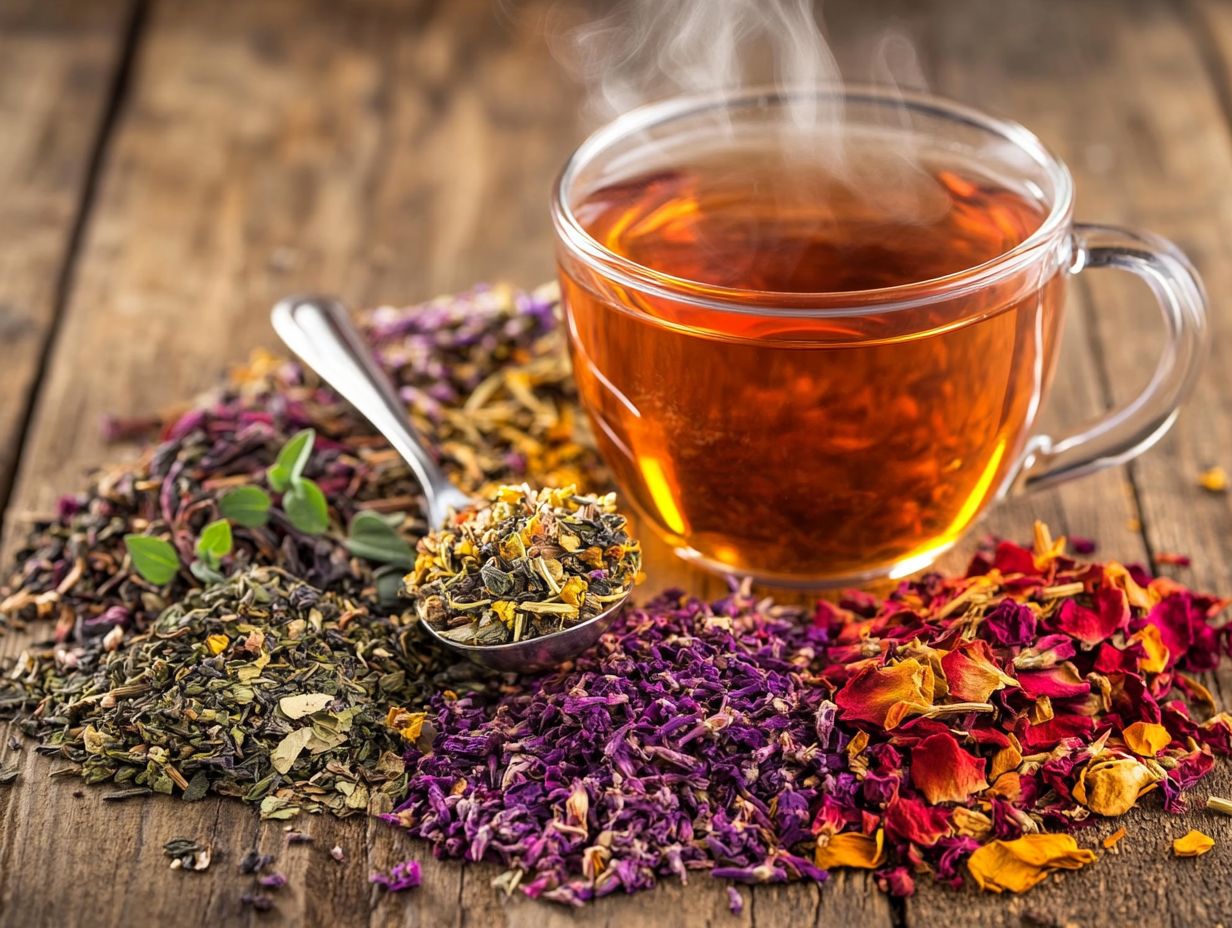
1. What should I look for in quality herbal tea?
Consider the ingredients, sourcing, processing methods, taste, and aroma.
2. Why check the ingredients before buying herbal tea?
Check to avoid additives or artificial flavors that may harm the tea’s quality.
3. How can I tell if herbal tea is ethically sourced?
Look for certifications like Fair Trade or Rainforest Alliance. Research the company s sustainability efforts.
4. Does processing affect herbal tea quality?
Yes, opt for minimally processed teas without artificial ingredients for better quality.
5. What should quality herbal tea taste and smell like?
It should be balanced and pleasant with a natural aroma. Avoid any chemical flavors.
6. Are there any reliable herbal tea brands?
Brands like Traditional Medicinals, Yogi Tea, and Celestial Seasonings are known for quality. Research and read reviews before buying.

